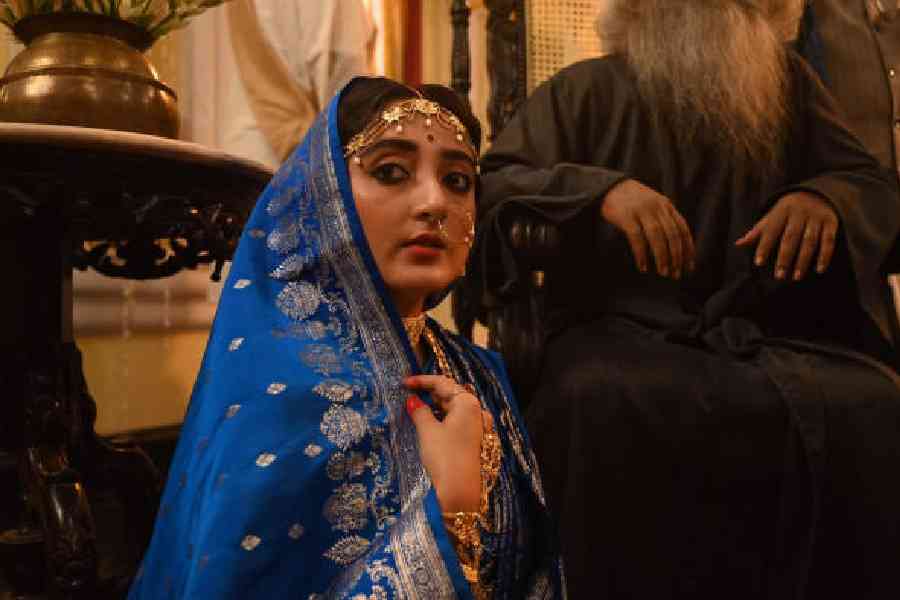For many of us, the tale of ‘nishir daak’ takes us back down memory lane — to stories of a spirit that lures individuals to their demise by whispering their names three times in a familiar voice. Now streaming on Hoichoi, Nishir Daak, directed by Joydeep Mukherjee, weaves this well-known folklore into a gripping horror mystery inspired by singer Nishigandha Bhaduri. Actress Surangana Bandyopadhyay brings depth to her portrayal, skillfully balancing her dual roles as Nishigandha Bhaduri and her transformation into the vengeful spirit Nishi. A t2 chat with Surangana...
Nishir Daak draws inspiration from supernatural folklore. What appealed to you when you first received the script?
What really drew me in was how music was connected with the storyline. It is a major part, if not the most important aspect of the script. Knowing Joydeepda (Mukherjee, director) as an avid music lover, I knew he would do justice to the usage of music in this story. Plus, the chance to perform Rabindrasangeet in the series was a delightful bonus for me.
How has the feedback been so far?
Till now, the feedback has been good. There will always be room for growth, and I often find those areas myself. But, it’s important that people are watching it and are talking about it. I’ve received a lot of love for the songs, and I truly appreciate that. When it comes to music, my final stage of validation is with my parents, especially my father, because both my parents are wonderful vocalists. And my father used to be a music teacher, too, so he is a bit more critical and specific. But, he appreciated it a lot, so I’m happy about that.
You play a convincing ghost in the series. Are you a fan of the horror genre?
(Laughs) Thank you! How convincing a horror element is in a horror story like this, where you can barely see the face and mostly feel the presence, depends more upon the making of it. Yes, I’ve always been a fan of this genre.
What’s your favorite read or watch in horror?
When it comes to films, I can always name the classics, but then the list wouldn’t end. Among the recent ones, I’m a fan of anything Mike Flanagan makes. He’s an absolute genius. Also, I love Jordan Peele’s works in this genre. And recently I’ve been blown away by Sinners and Bring Her Back.
We’ve seen your portrayal in horror shows like Parnashavarir Shaap and Nishir Daak. What draws you to this genre as an actor?
Being an actor feels a lot like being a magician. The audience knows it’s all make-believe, yet somehow they end up feeling a whirlwind of emotions — laughter, tears, fear, you name it. I remember Riddhi (Sen, actor) often pointing this out, and it becomes clearer to me every day. With horror, it’s particularly intriguing; I don’t believe in ghosts, yet it’s fascinating how we’re able to create a world that can send chills down anyone’s spine, regardless of their beliefs. I find it fascinating to portray a possessed character, as I have no emotional memory to draw from. My performance relies solely on the craft.
What kind of preparation goes into these intense scenes?
I just carefully read the script, intently listen to what the director wants out of the scene or out of the whole series and try my best to do justice to the character given. I usually try not to think of it as a character in a horror film or series, or as a character who is possessed; it’s just another character that I need to do convincingly. Convincing the audience that I’m happy, or sad, or falling in love and convincing the audience that I’m possessed is equally difficult. Communicating with the director is the most important part when it comes to horror. Like for Paramda's (Parambrata Chattopadhyay) show, what worked is our shared liking towards horror as a genre.
What sort of challenges do you encounter?
Horror itself is a challenge; it’s challenging to scare or even make people flinch. We are used to far too many horrors, not just in cinema, but in the real world. It doesn’t take long for people to forget someone’s death, or let’s say, to even forget a war. I’ve seen people unbothered by most of the violence around. Instilling fear in such a society through films or series is the hardest thing to do.
As a singer, did you face any unsettling moments during filming, considering the musical elements of the plot?
Not at all! It was actually quite exciting. I used to sing the song Baaje koruno sure at odd times and at odd places on set, and people on set invariably turned around to look where it’s coming from! (Laughs)
Your portrayal in the series as a ghost was stunning, not at all macabre! What’s your reaction to macabre horror as an actor? Is it easier to watch knowing the craft behind it?
I don’t have issues with macabre or gore; I watch a little bit of everything. It can sometimes pull us away from understanding the craft, but a good film really makes you forget about the process, regardless of the genre.
The cast being young, what was the atmosphere like on set?
I mostly shared scenes with Sreeja. Working with her was delightful; she was the youngest on our team and incredibly sweet, kind, and hardworking. I admired her dedication to the script — she would read it multiple times and ask questions. Her eagerness to learn from each experience was inspiring and made working together enjoyable. It’s always a pleasure when everyone is serious about their work.
Do you think there was more depth to your character that could have been explored?
It's honestly up to the makers. I worked with what I was given and tried to do justice to it. My knowledge of nishir daak comes from childhood tales my grandmother shared, but this series takes the folklore and presents it in a unique context.
What was it like being directed by Joydeep Mukherjee?
I have worked with him previously in Achinta Aich Season 1. He is an extremely calm and well-organised director with a precise technical vision. His approach created a relaxed atmosphere on set, which was beneficial for the actors.
You’re actively involved in theatre and managing it alongside your screen roles. Is that ever challenging, or does it enhance your craft?
It’s an absolute blessing that I’m a part of Swapnasandhani. We don’t get to shoot every week, but we do get to rehearse in a theatre. In that way, it really does help to constantly have a place and to have such brilliant teachers who can teach you the craft. There are two things which have helped me be more confident and comfortable with myself than before: One is Riddhi. I cannot even begin to explain what contribution he has in my life. And next is the experience of working with a group of actors on stage in Swapnasandhani.
As a contemporary young actor, how does the rise of OTT platforms influence your exploration of the craft compared to securing film roles, which can take a considerable amount of time?
There are positive and negative aspects to everything; OTT is not an exception. OTT has undeniably opened up more opportunities, which is helpful. However, I dislike the trend of people preferring to wait for films to stream rather than enjoying them in theatres. There’s just no substitute for the cinematic experience of watching a film on the big screen.











